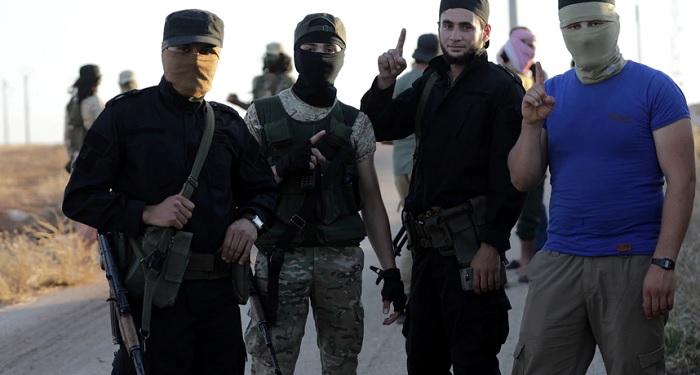
A powerful Islamist militant group in the northwestern Syrian province of Idlib has launched a military campaign against rival jihadist groups, local news reports and rights groups said Sunday.
Hayat Tahrir al-Sham (HTS), the dominant force in Idlib, the last major rebel stronghold in Syria, on Sunday began targeting villages in the western part of Idlib where jihadists have significant presence, according to the Syrian Observatory for Human Rights.
The Syrian Observatory, which monitors war developments in the country, said HTS fighters raided the village of Arab Saeed in Idlib, arresting several jihadist militants, including a leader with the Hurras al-Din group.
Hurras al-Din is one of several jihadist factions that have been operating in northwestern Syria. The group is al-Qaida’s main affiliate in the war-torn country.
Before formally severing ties with the global jihadist group in 2016, HTS was regarded as the Syrian branch of al-Qaida. At the time, it was known as the al-Nusra Front.
The crackdown comes nearly two weeks after several jihadist groups, including Hurras al-Din, announced the formation of a joint operations room to coordinate efforts in the fight against Syrian government troops and allied forces.
A local administration in Idlib backed by the HTS issued a statement Sunday, saying no armed groups are allowed to operate in the city of Idlib, except for those affiliated with the HTS.
Neutralizing extremists
The Syrian Observatory said the fighting Sunday between HTS and Hurras al-Din forced the latter to agree to a cease-fire that required the jihadist group to evacuate its headquarters and withdraw from certain parts of Idlib.
Rami Abdulrahman, director of the Syrian Observatory, charges that the ongoing crackdown by HTS against other extremist groups in the restive province has been approved by the Turkish military.
“As part of this campaign, the Turkish government is trying to neutralize groups that are more radical than HTS,” he told VOA. “In one way or another, the HTS coordinates its efforts with the Turkish forces.”
Turkey rejects allegations that HTS is coordinating its recent efforts with Turkey-backed rebels.
Turkey, however, maintains a significant military presence in Idlib and other parts of northwestern Syria, while supporting Syrian rebel groups present there.
In March, Turkey and Russia brokered a cease-fire deal in Idlib aimed at bringing an end to a Syrian government offensive that had begun last year to recapture Idlib.
The two countries reached the agreement after several previous unsuccessful deals over Idlib, which is currently home to more than 2 million people.
According to all those agreements, Turkey was required to remove all extremist groups from the province, including those allied with the al-Qaida.
In 2018, Turkey officially designated the HTS as a terrorist organization. The designation came a few days before one of the agreements between Turkey and Russia over Idlib. According to that agreement too, the HTS was among the radical groups to be removed from Idlib by Turkey.
M4 significance
The current truce between Russian-backed Syrian troops and Turkish-backed rebels in Idlib remains largely holding as Russia and Turkey have been conducting joint patrols in the Syrian province.
Jihadist groups active in Idlib have consistently rejected cease-fires in the province, including the joint Russian-Turkish patrols on parts of the strategic M4 Highway that connects the two Syrian provinces of Aleppo and Latakia and goes through Idlib.
Abdulrahman of the Syrian Observatory said Turkey has been trying to remove all obstacles that stand in the way of fully implementing its agreement with Russia, and therefore it has decided to unofficially support HTS efforts to weaken the jihadists in Idlib.
Aymenn Jawad al-Tamimi, a Syria researcher at Swansea University in the U.K., says he doesn’t believe the HTS crackdown came because of Turkish orders.
However, he told VOA, “the end result is that this [campaign] allows the Turkey-Russia patrols to proceed and is an end to the limited leeway HTS previously granted its jihadist rivals.”
The Islamist group seeks to subdue those jihadist rivals who attempt to challenge its monopoly on power in Idlib, al-Tamimi said.
“What HTS once saw as a nuisance it could keep under control now became more of a threat in its eyes requiring to be properly subdued, though not necessarily eliminated,” he added.
And while the HTS may use rhetoric against the Russian-Turkish agreement over Idlib, in practice it abides by it, al-Tamimi said.
Political benefit
Some experts believe the HTS campaign to target extremists is a bid by the militant group to be included in any political settlement over Idlib and Syria as a whole.
“HTS has been trying to signal – to Turkey, most immediately, but by implication to the wider international community – for some time that it can be an acceptable long-term actor in Syria, and attacking an avowed al-Qaida group like Hurras al-Din is certainly a way to do that,” Kyle Orton, a Syria researcher based in London, told VOA.
The timing of this campaign, however, seems to be sending mixed signals.
“HTS could have wiped out Hurras al-Din at any time and chose only to move when there was political benefit, or HTS is not in fact capable of eliminating Hurras al-Din, so even on cold realist terms HTS is useless in handling the issue that most external actors care about, namely transnational terrorists,” Orton concluded.
 Eurasia Press & News
Eurasia Press & News

